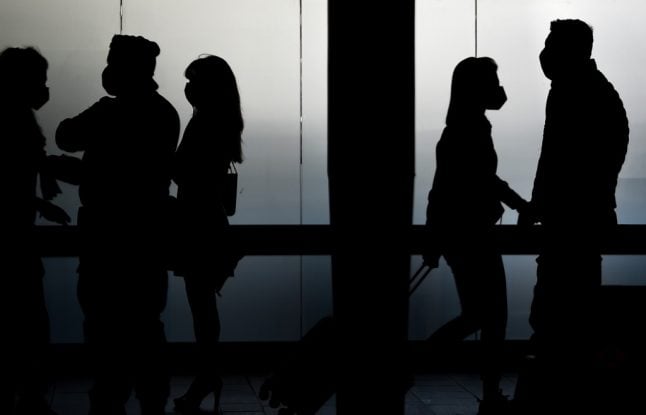Italy's government imposed extra travel restrictions over Christmas and New Year to discourage unnecessary holidays amid concerns that the coronavirus infection rate is not falling fast enough.
From December 21st to January 6th, anyone who arrives in Italy from overseas – no matter which country and no matter their nationality – must observe a 14-day quarantine.
With the rule about to expire on January 6th, what happens after that?
Could you potentially avoid quarantine by arriving in Italy just one day later?
The answer, the government has confirmed, is no.
The latest emergency decree of December 3rd, which set Italy's Christmas travel rules, states that quarantine applies to everyone who has stayed or transited through another country at any point between December 21st and January 6th (full text here: see article 8, paragraph 7).
As the Interior Ministry subsequently clarified in a circular, that means that people who leave Italy before December 21st or return after January 6th must also quarantine.
In other words, if you return to Italy on or after January 7th having spent part or all of December 21st-January 6th abroad, you will still have to quarantine.
The only exceptions are for people who had to leave Italy for essential reasons, including work, health, study or emergencies.
If you left Italy for any other purpose, such as tourism, you'll have to quarantine whatever your reasons for returning to Italy, the Health Ministry's website states.
Translation: an Italian resident can't choose to go skiing in Switzerland or visit friends in Spain, for example, then return to Italy and hope to avoid quarantine by saying they need to be back here for work.
That's because the main purpose of the rule seems to be to make taking a vacation abroad as difficult as possibly without actually introducing a travel ban.
However, an Italian resident who has to go to France for work or urgent surgery, for example, would be allowed to return to Italy without quarantining – but they do have to get a coronavirus test 48 hours before they come back. (Find further example scenarios on the Foreign Ministry's website.)
There are other exemptions from both quarantine or testing for cross-border workers, healthcare workers, diplomats and people transiting through Italy via their own transport: find more details here.
The rule primarily affects people entering Italy from another EU member state, a country in the Schengen zone or the UK, since travellers from these countries would not usually be subject to quarantine.
Arrivals from any other country have to quarantine for 14 days regardless, not only during the Christmas period. Travellers from the UK should also be prepared to find themselves subject to different rules after the Brexit transition period ends on December 31st.
REMINDER: What Brits in Europe need to know about travel after December 31st
The Local was alerted to the situation one of our readers, who was advised by an Interior Ministry representative that he would still have to quarantine if he returned to Italy after January 7th.
“I was originally planning on leaving Italy on the 19th of December and returning on the 9th of January but will now have to, unfortunately, return on the 27th of December in order to do the mandatory 14-day quarantine before starting work,” he told The Local.
It is not clear how long the rule will remain in place: Italy's current decree expires on January 15th, though the government may revise the rules at any point before then.
Find The Local's latest updates on Italy's travel rules here.



 Please whitelist us to continue reading.
Please whitelist us to continue reading.
actually if you use the new online tool to determine the rules you mention in the other article:
https://infocovid.viaggiaresicuri.it/returningtoitaly.html
it gives the result that you can do not need to quarantine if you arrive after Jan 7th, if you have a negative test within the last 48 hours? (For EU citizens)
like this:
Based on your answers, you can enter Italy. Read carefully the information provided below.
You must fill out a self-declaration.
Since you chose to enter/return to Italy starting from January 7 2021 onwards, kindly note that:
1. If you enter/return to Italy after January 6 2021, after a stay or transit in a Country listed in List C between December 21 and January 6 (click on the blue button on top of the page to check the Lists of Countries and territories), for reasons other than those indicated in article 6 paragraph 1 letters a), b) or c) of Prime Ministerial Decree of December 3 2020 (i.e. proven work reasons, health, absolute urgency);
You must self-isolate for 14 days.
2a). If you enter/return to Italy after January 6 2021, after a stay or transit in a Country listed in List C between December 21 and January 6, for proven work reasons, health, absolute urgency (as an example, you went from Rome to Paris for a short business trip and now you are going back to your home in Italy, or you must enter Italy from Bulgaria due to a scheduled surgery for which you will have to stay in Italy for about 10 days);
or
2b). If you enter Italy after January 6, 2021 from a C-List Country where you reside, without further stays or transits in other Countries in the previous 14 days;
You must prove that you have undergone a molecular or antigenic test carried out by means of a swab, in the 48 hours before you arrive, with a negative result.
In either case, as soon as you enter the national territory, you must inform your Local Health Authority of reference. From December 10, if you are unable to undergo a molecular or antigenic test within 48 hours prior to entering Italy, once in Italy you must self-isolate for 14 days.